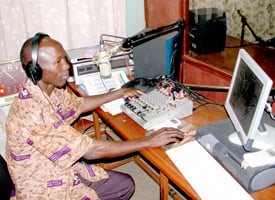MENU
(April 22, 2011 - by Harold Goerzen) With military and student protests creating unrest in Burkina Faso, a Christian radio network is countering the West African country's chaos with information and spiritual counsel.
"I believe that God is using Radio Evangile Développement (RED) to heal our nation," said Étienne Kiemdé who directs the network. "We cover many topics, and we are heard well. Pray that God would continue to use us as a tool to bless and free our nation." The eight-station ministry covers nearly two-thirds of Burkina Faso.
Kiemdé asked for people to pray for wisdom and God's protection. "We're thankful to God because RED is safe none of the staff has been hurt," he said. "We are broadcasting special music of reconciliation, and we broadcast programs talking about human rights and behavior. And of course the different messages that churches are providing contribute to the encouragement of our listeners these days."
He added that the network is "seeking more equipment to upgrade three of our radio stations and to establish a new one. And we're seeking a power generator for the main station in Ouagadougou to take over in case of periodical power outages."
Until recently, Burkina Faso had enjoyed more than 20 years of peace. In late March, however, military personnel denounced authorities and "they were complaining about not receiving compensation that had been promised to them for long time," Kiemdé explained.
A mutiny on Thursday, April 14, erupted in Ouagadougou, the capital, when members of the presidential guard began firing into the air, demanding unpaid housing allowances. The incident represented the most serious challenge to the administration of President Blaise Compaore who came to power in a 1987 coup. Compaore dissolved his government amid the uprisings and appointed new security chiefs, but by Monday soldiers in several cities had joined the protest.
Once soldiers were paid, however, calm returned to the capital. Compaore later announced the appointment of a new prime minister, Luc-Adolphe Tiao, Burkina Faso's current ambassador to France and a longtime ally of the president.
In a separate protest on Monday, students in the western Koudougou area burned down the headquarters of the ruling party, a residence of Tertius Zongo-dismissed as prime minister last week-and the home of the headmaster, locals said. Six people died in the students' protests, and about 50 others were injured. By Tuesday calm had mostly returned across the country after a spokesman for mutinous soldiers called an end to their revolt.
Begun with a single station in the capital in 1993, RED later added stations in Bobo-Dioulasso, Ouahigouya, Léo, Yako, Koudougou, Houndé and Fada N'gourma. Broadcasts emanate in French, English and 13 indigenous languages spoken in the country of 16.3 million where 8.9 percent of the residents are evangelical.
Late last year an HCJB Global Hands team from Ecuador traveled to Burkina Faso to work at a clinic/orphanage directed by Joanna Ilboudo, a former manager at RED. Team members later collaborated with an HCJB Global Voice staff member by conducting a medical clinic at a station in Ghana. An international medical team also conducted a mobile medical clinic and community development projects in Burkina Faso in March 2009.
Sources: HCJB Global, Associated Press, AFP
 |
| Studio at the RED station in Bobo-Dioulasso. |
Kiemdé asked for people to pray for wisdom and God's protection. "We're thankful to God because RED is safe none of the staff has been hurt," he said. "We are broadcasting special music of reconciliation, and we broadcast programs talking about human rights and behavior. And of course the different messages that churches are providing contribute to the encouragement of our listeners these days."
He added that the network is "seeking more equipment to upgrade three of our radio stations and to establish a new one. And we're seeking a power generator for the main station in Ouagadougou to take over in case of periodical power outages."
Until recently, Burkina Faso had enjoyed more than 20 years of peace. In late March, however, military personnel denounced authorities and "they were complaining about not receiving compensation that had been promised to them for long time," Kiemdé explained.
A mutiny on Thursday, April 14, erupted in Ouagadougou, the capital, when members of the presidential guard began firing into the air, demanding unpaid housing allowances. The incident represented the most serious challenge to the administration of President Blaise Compaore who came to power in a 1987 coup. Compaore dissolved his government amid the uprisings and appointed new security chiefs, but by Monday soldiers in several cities had joined the protest.
Once soldiers were paid, however, calm returned to the capital. Compaore later announced the appointment of a new prime minister, Luc-Adolphe Tiao, Burkina Faso's current ambassador to France and a longtime ally of the president.
In a separate protest on Monday, students in the western Koudougou area burned down the headquarters of the ruling party, a residence of Tertius Zongo-dismissed as prime minister last week-and the home of the headmaster, locals said. Six people died in the students' protests, and about 50 others were injured. By Tuesday calm had mostly returned across the country after a spokesman for mutinous soldiers called an end to their revolt.
Begun with a single station in the capital in 1993, RED later added stations in Bobo-Dioulasso, Ouahigouya, Léo, Yako, Koudougou, Houndé and Fada N'gourma. Broadcasts emanate in French, English and 13 indigenous languages spoken in the country of 16.3 million where 8.9 percent of the residents are evangelical.
Late last year an HCJB Global Hands team from Ecuador traveled to Burkina Faso to work at a clinic/orphanage directed by Joanna Ilboudo, a former manager at RED. Team members later collaborated with an HCJB Global Voice staff member by conducting a medical clinic at a station in Ghana. An international medical team also conducted a mobile medical clinic and community development projects in Burkina Faso in March 2009.
Sources: HCJB Global, Associated Press, AFP
